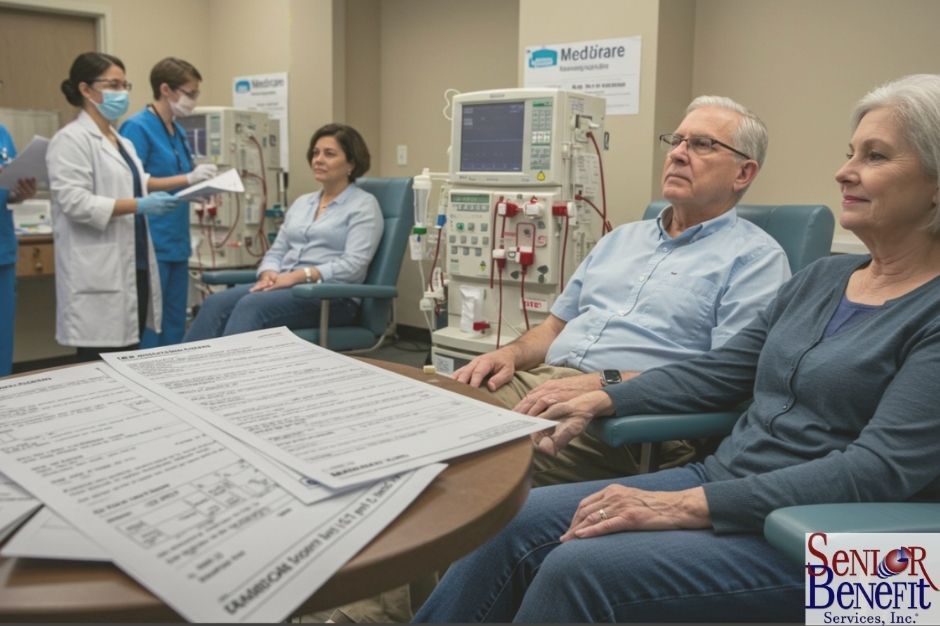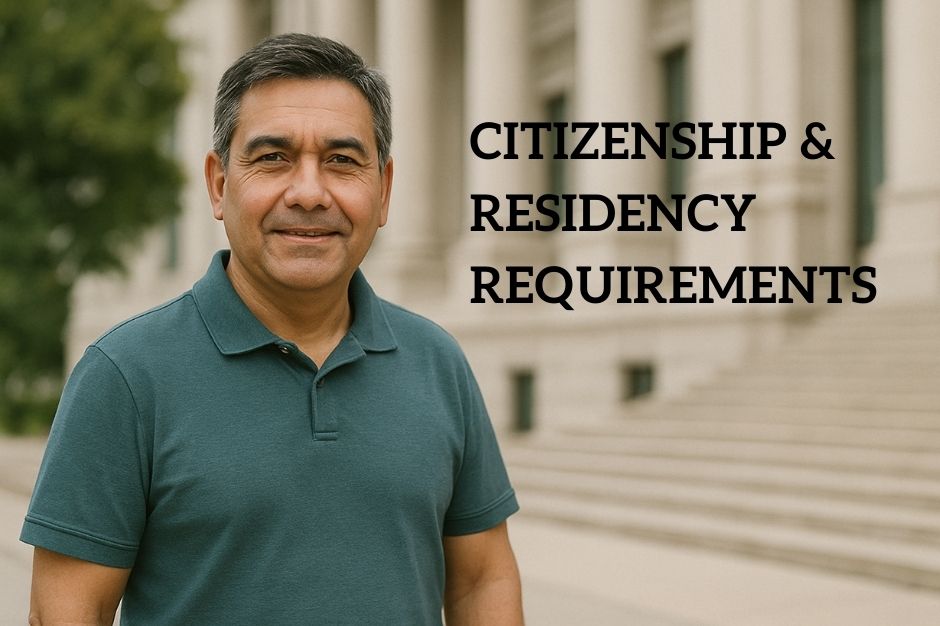Have You Ever Wondered if You’re Eligible for Medicare?
Are you approaching retirement age or dealing with a disability and wondering if you qualify for Medicare? You’re not alone. Every day, thousands of Americans search for clear answers about Medicare eligibility.
I’m David Kurtz, President of Senior Benefit Services, and my team and I have spent years helping people navigate the Medicare system. I can tell you that understanding your eligibility is the critical first step.
Without this knowledge, you might miss enrollment deadlines, face unnecessary penalties, or go without coverage you’re entitled to receive.
Medicare Eligibility Key Takeaways
- Age Surprise: Turning 65 doesn’t always mean what you think for Medicare – there’s a critical detail about retirement most people miss.
- Disability Shortcut: The “hidden bypass” for disability patients that few advisors mention (plus the one condition that gets you immediate coverage).
- Residency Trap: Why citizenship alone isn’t enough – the 5-year rule that catches thousands off guard every year.
- Cost Saver: The work history loophole that could save you $518 monthly (or cost you if you’re not careful).
- Enrollment Danger: Automatic enrollment might be a myth for your situation – the deadline mistake that can’t be undone.
- 2025 Benefit: The 2025 rule change that caps your costs at $2,000 and expands a program most beneficiaries never hear about.
- Family Advantage: Why the spouse connection matters more than ever – even if you’re divorced or widowed.
Confused by all the literature you get about Medicare Supplements and Medicare Advantage plans? At Senior Benefit Services, we stop the confusion!

At Senior Benefit Services, we specialize in finding the most cost-effective Medicare options for our clients. Many people overpay for Medicare simply because they don’t know all their options. Our advisors help you understand all your costs and identify savings opportunities.
As one of our clients mentioned in a Google review: “Karen from Senior Benefit Services was so patient at sifting through all my information and helping me select the most cost-effective Medicare package. Her understanding of the Medicare system was exceptional.”
Call us at
(800) 924-4727 to discuss your specific situation and learn what your actual Medicare costs would be.
Medicare Eligibility by Age
The most common path to Medicare eligibility is reaching age 65. I’ve seen too many clients assume they need to be retired to qualify, but that’s not the case at all.
Here’s the truth: If you’re 65 or older and a U.S. citizen or permanent resident who’s lived in the United States legally for at least five consecutive years, you qualify for Medicare. Period.
But here’s where it gets interesting. Your eligibility for premium-free Part A (hospital insurance) depends on your work history. If you or your spouse paid Medicare taxes for at least 10 years (40 quarters), you’ll get Part A without paying a monthly premium.
One of our clients at Senior Benefit Services shared this with me: “I was so confused about Medicare until I realized I could enroll at 65 even though I was still working full-time. Knowing I qualified based on my age alone took a huge weight off my shoulders. Thanks to your team for explaining everything so clearly!
Medicare Eligibility Through Disability
Not yet 65? You might still qualify for Medicare if you have a qualifying disability.
The standard pathway is receiving Social Security Disability Insurance (SSDI) benefits for 24 months. This two-year waiting period is one of the most challenging aspects of disability-based Medicare eligibility.
During my time working with disability advocates, I’ve seen the struggles people face during this waiting period. The good news is that once you reach the 24-month mark, your Medicare enrollment happens automatically.
Railroad workers receiving disability benefits from the Railroad Retirement Board follow similar rules, with eligibility typically starting after 24 months of disability benefits.
Mark, a former construction worker and client of Senior Benefit Services, told me: “After my accident, navigating the disability system was overwhelming. I wasn’t aware that Medicare would kick in after 24 months on SSDI. When it did, it opened up so many more treatment options for me. Your advisors made a world of difference in helping me understand my benefits.”
For ESRD patients, Medicare coverage typically begins on the first day of the fourth month of dialysis treatments. However, there are two ways to get coverage earlier:
If you participate in a home dialysis training program through a Medicare-certified training facility during the first three months of dialysis
If you’re admitted to a hospital for a kidney transplant or for health services you need before the transplant.
Jennifer came to Senior Benefit Services right after her husband developed ESRD at 52, shared: “After my husband’s kidneys failed, we were terrified about the costs. Your advisor explained he qualified for Medicare before 65 because of ESRD, which was life-changing information.
Medicare Eligibility for ESRD Patients
End-Stage Renal Disease (ESRD) creates a special eligibility pathway to Medicare at any age.
If you have ESRD requiring regular dialysis or if you’ve had a kidney transplant, you may qualify for Medicare regardless of your age.
However, you must also meet one of these conditions:
- You’ve worked the required time under Social Security, the Railroad Retirement Board, or as a government employee
- You’re already receiving or are eligible for Social Security or Railroad Retirement benefits
- You’re the spouse or dependent child of someone who meets either of the above requirements
You’ve worked the required time under Social Security, the Railroad Retirement Board, or as a government employee
You’re already receiving or are eligible for Social Security or Railroad Retirement benefits
You’re the spouse or dependent child of someone who meets either of the above requirements
For ESRD patients, Medicare coverage typically begins on the first day of the fourth month of dialysis treatments. However, there are two ways to get coverage earlier:
- If you participate in a home dialysis training program through a Medicare-certified training facility during the first three months of dialysis
- If you’re admitted to a hospital for a kidney transplant or for health services you need before the transplant.

Medicare Eligibility for ALS Patients
If you have Amyotrophic Lateral Sclerosis (ALS, also known as Lou Gehrig’s disease), Medicare eligibility works differently.
You qualify for Medicare immediately upon being approved for Social Security Disability benefits. There’s no 24-month waiting period like there is for other disabilities.
This expedited eligibility recognizes the rapid progression and serious nature of ALS. It ensures that patients can access needed medical care without delay.
Citizenship and Residency Requirements
Medicare eligibility has specific citizenship and residency requirements.
U.S. citizens and permanent residents who have lived in the United States legally for at least five consecutive years typically qualify for Medicare at age 65.
For non-citizens, the rules can get complicated. Generally, lawful permanent residents (green card holders) must meet the five-year residency requirement unless they have enough work history (40 quarters/10 years) paying Medicare taxes.
Carlos, who moved to the U.S. from Mexico and gained permanent residency, explained after meeting with a Senior Benefit Services advisor: “I was worried about healthcare after turning 65 since I’d only had my green card for three years. Your Medicare specialist helped me understand that I needed to wait two more years to reach the five-year residency requirement before I could enroll. They even scheduled a follow-up appointment for
when I’d be eligible.”
Work History Requirements
Your work history directly affects your Medicare Part A costs.
To get premium-free Part A (hospital insurance), you generally need 40 quarters (10 years) of Medicare-covered employment where you paid Medicare taxes.
If you have fewer quarters, you can still get Part A, but you’ll pay a monthly premium:
Robert, a freelancer with inconsistent tax contributions who visited our Cumberland office, told me: “I was shocked to learn I’d have to pay over $500 monthly for Part A because I only had 25 quarters of Medicare tax payments. Thanks to your team at Senior Benefit Services, I now have a plan to manage these costs. I just wish I’d come to you earlier in my career to understand the importance of those contributions.”
Qualifying Through a Spouse
Here’s something many people miss:
You can qualify for Medicare through your spouse’s work record.
You might be eligible for premium-free Part A based on your spouse’s work history if:
- Your spouse has at least 40 quarters (10 years) of Medicare-covered employment
- You’ve been legally married for at least one year
- Your spouse is at least 62 (even if not taking Social Security yet)
This provision is especially important for those who worked in jobs not covered by Medicare taxes or who took time away from the workforce.
Divorced individuals can even qualify based on an ex-spouse’s work record if:
- The marriage lasted at least 10 years
- You’re currently unmarried
- You’re at least 62 years old
Widows and widowers may qualify based on a deceased spouse’s work record if:
- The marriage lasted at least 9 months before the spouse’s death
- You’re currently unmarried
Maria, who primarily worked as a homemaker and visited our Thurmont office, shared: “After 40 years of marriage, I worried about healthcare costs when turning 65. My advisor at Senior Benefit Services explained I could get premium-free Medicare Part A based on my husband’s work history, which was a tremendous relief. Your team made the whole enrollment process so easy.”
How Senior Benefit Services Can Help Check Your Eligibility
Wondering if you qualify for Medicare? At Senior Benefit Services, we provide free eligibility verification and Medicare guidance:
- Schedule a free consultation with our Medicare specialists:
- Our experts will verify your eligibility:
- We’ll review your age, work history, and other qualifying factors
- We’ll explain when you can enroll and what plans are available
- We’ll help you understand all your coverage options with no obligation
- We can confirm your existing Medicare coverage:
- We’ll help you understand what parts of Medicare you already have
- We’ll look for coverage gaps or areas where you might save money
- We’ll provide clear, personalized recommendations based on your needs
Our Senior Benefit Services team makes checking your Medicare eligibility simple and stress-free. Unlike calling government agencies and waiting on hold, our experts provide personalized assistance to verify your status and guide you through your options.
Betty from Cumberland told us: “Senior Benefit Services helped explain the benefits and helped me choose a plan that was right for me. I was turning 65 and did not understand what to expect with Medicare. John was very helpful and walked me through everything.”
Medicare Enrollment Periods
Even if you’re eligible for Medicare, you need to know when to enroll to avoid penalties.
Initial Enrollment Period (IEP): This is your first chance to sign up for Medicare. It’s a 7-month period that includes:
- The 3 months before you turn 65
- The month you turn 65
- The 3 months after you turn 65
Special Enrollment Period (SEP): If you delayed Medicare enrollment because you had creditable employer coverage, you qualify for an SEP when that coverage ends. This gives you 8 months to enroll without penalty.
General Enrollment Period (GEP): If you miss your IEP and don’t qualify for an SEP, you can sign up during the General Enrollment Period from January 1-March 31 each year, with coverage starting July 1.
⚠️ Important: Missing your enrollment period can result in permanent late enrollment penalties and gaps in coverage.
Medicare Costs
Understanding Medicare costs helps you budget effectively for healthcare in retirement.
Part A (Hospital Insurance):
- $0 monthly premium if you or your spouse paid Medicare taxes for 40+ quarters
- $285/month with 30-39 quarters of work (Estimated Costs)
- $518/month with fewer than 30 quarters of work (Estimated Costs)
Part B (Medical Insurance):
- $185.00/month standard premium (Estimated Costs)
- Higher premiums for those with income above $103,000 (single) or $206,000 (married)
Part D (Prescription Drug Coverage):
- Varies by plan, averaging $55/month
- New (estimated cost) $2,000 annual out-of-pocket cap
- Income-related surcharges may apply
⭐⭐⭐⭐⭐ Google Review “Senior Benefit Services was the best decision I made in choosing someone to help me navigate my retirement options! Karen was amazing! She really knew her stuff and gave me several avenues to choose from but also she carried thru with all the details of completing my application. It was a stress-free experience!” — Deborah R., Maryland
Don’t navigate Medicare alone! Our team of licensed advisors at Senior Benefit Services can verify your eligibility for free and help you understand all your coverage options. Call (800) 924-4727 today for your free Medicare consultation. Or visit one of our offices:
Requirements For Medicare Eligibility
The three fundamental requirements for Medicare eligibility are:
- Age or qualifying condition:
- Being 65+ OR
- Having a qualifying disability for at least 24 months OR
- Having End-Stage Renal Disease (ESRD) OR
- Having Amyotrophic Lateral Sclerosis (ALS)
- Citizenship/residency status:
- Being a U.S. citizen OR
- Being a legal permanent resident with at least 5 years of continuous residency in the United States
- Work history requirements:
- Having sufficient work credits (40 quarters/10 years) for premium-free Part A, OR
- Being willing to pay a premium if you have fewer credits, OR
- Qualifying through a spouse’s work history
At Senior Benefit Services, we handle these requirements for you. Our advisors will review your situation and clearly explain which requirements you meet and what options are available to you. Call us at
(800) 924-4727 to speak with an experienced Medicare specialist who can walk you through your specific eligibility status.
Is Anyone Eligible for Medicare?
Not everyone is eligible for Medicare. Eligibility is specifically limited to:
- U.S. citizens and legal permanent residents with at least 5 years of continuous residency
- People aged 65 or older, OR
- People under 65 with qualifying disabilities who’ve received SSDI for 24 months, OR
- People of any age with End-Stage Renal Disease or ALS (with specific requirements)
Undocumented immigrants and people who don’t meet the residency requirements are not eligible for Medicare.
If you’re unsure about your eligibility status, the team at Senior Benefit Services can help. Many of our clients come to us confused about whether they qualify.
Our advisors can quickly assess your situation and explain your eligibility options. We have experience with complex cases including green card holders, those with non-traditional work histories, and people with specific medical conditions.
During your consultation, we’ll explain exactly which Medicare benefits you’re eligible for and when you can enroll. Call us at
(800) 924-4727 to schedule your free eligibility check.
- Free Consultation: We’ll explain your Medicare options and when to apply
- 10-Minute Application: We handle the paperwork to get you enrolled quickly
- Ongoing Support: We’re here to help even after your coverage begins
Does Everyone Have to Pay $170 a Month for Medicare?
No, not everyone pays the same amount for Medicare:
- Part A (Hospital Insurance):
- Most people get this premium-free based on their work history (or a spouse’s)
- If you have 30-39 quarters of work credits, you’ll pay $285/month (estimate cost)
- If you have fewer than 30 quarters, you’ll pay $518/month (estimate cost)
- Part B (Medical Insurance):
- The standard premium is $185/month (estimate cost) for most beneficiaries
- Higher-income individuals pay more through Income-Related Monthly Adjustment Amounts (IRMAA)
- Low-income beneficiaries may qualify for assistance programs that reduce or eliminate these costs
- Additional Coverage:
- Part D (prescription drug coverage): Varies by plan, averaging $55/month
- Medicare Supplement (Medigap): Varies by plan, location, and age, typically $50-$300+/month
- Medicare Advantage: Many $0 premium plans available, though costs vary widely
Do I Automatically Get Medicare When I Turn 65?
You only get Medicare automatically at 65 if you’re already receiving Social Security or Railroad Retirement Board benefits at least 4 months before your 65th birthday.
If you’re not receiving these benefits (which is increasingly common as many people work past age 65), you must actively apply for Medicare. This is a crucial point that many people misunderstand and can lead to costly penalties if you miss your enrollment window.
At Senior Benefit Services, we’ve helped thousands of clients navigate this transition. Our “3 Steps And You’re Done” approach makes enrollment simple:
We’ve seen many clients confused about automatic enrollment. One client, Mike from Hagerstown, told us: “I thought Medicare was automatic at 65, but my neighbor mentioned I needed to sign up.
I was just three months away from my birthday! The team at Senior Benefit Services guided me through enrollment and helped me avoid late penalties.”
Don’t leave your Medicare enrollment to chance. Call Senior Benefit Services at
(800) 924-4727 to ensure you don’t miss important deadlines.
Senior Benefit Services’s
Hagerstown Office
We are here to help. Contact us today!
Hours :
Monday – Firday : 9am – 5pm EST
Sat & Sun: Closed
Senior Benefit Service’s
Thurmont Office
We are here to help. Contact us today!
Hours :
Monday – Firday : 8am – 4pm EST
Sat & Sun: Closed
Senior Benefit Services’s
Cumberland Office
We are here to help. Contact us today!
Hours :
Monday – Firday : 9am – 5pm EST
Sat & Sun: Closed











